- Home
- Paul Finch
The Burning Man Page 12
The Burning Man Read online
Page 12
‘I take it you and Kayla were more than just school friends?’ Father Pat said, unlocking the door to his battered old Volvo.
‘We had a brief thing.’ Heck slid the card into the back pocket of his jeans. ‘Which, to be honest, is all my relationships with women have ever seemed to amount to.’
‘Just so you know – Kayla’s been through some tough times recently.’
Heck was amused by the tone of reproof.
‘I’m here to work, Uncle Pat,’ Heck reassured him. ‘Not mess with people’s heads.’
‘I’m not trying to judge you, son. It’s just that I’ve got to know Kayla quite well, and she may seem very strong and together, but underneath all that she’s probably a bit more vulnerable than you may think.’
‘No worries.’ Heck dug out his own car keys. ‘Like I say, I’m only up here as long as I need to be. Not one second longer.’
Chapter 13
Shelley Harper couldn’t wait to get away from the reception in the atrium at the Town Hall. Mainly so that she could evade the groping hands of Councillor Croakwell.
It was a rather splendid affair, but somewhat incongruous inside the tall, glass-roofed chamber with its purposely functional steel-girder reinforcements and encircling walls made exclusively of red brick, and frescoed with photographic images celebrating Bradburn’s industrial heyday: coalmines, mills, canal barges, sooty streets thronged with hard-faced working folk in flat caps and shawls. There was much shouting, guffawing and clinking of glasses, and a lot of tactile contact from Councillor Croakwell as he wheeled Shelley back and forth, introducing her to sundry colleagues, the vast majority of whom seemed to be elderly men, all wide-eyed with admiration, loudly acclaiming the beauty she brought to these ‘otherwise dull proceedings’, and congratulating her profusely on her choice of attire, which apparently was ‘suitably saucy’!
At Councillor Croakwell’s behest, she’d left the Our Mavis suit on for the party.
‘It doesn’t leave much to the imagination, my dear, but it could be worse, could be the same suit you wore for that lads’ mag all those years ago, eh – your birthday suit!’
Shelley smiled bravely through it all. But it was increasingly difficult. One guy he introduced her to was a real creep: Max Griddle, or something to that effect. He could have been anywhere between seventy and ninety, and was tall but pale and cadaverous. He leaned on a cane with a silver ram’s head at the end, and wore a rather old-fashioned suit: pinstriped and double-breasted, with a waistcoat. It hung on his emaciated frame like empty canvas, its shoulder panels patterned with dandruff from his lank white hair. His eyes were hidden behind impenetrably brown-lensed glasses, and his large, wet mouth was curved in a rictal grin, revealing overlong ivory teeth.
He said nothing, simply gazed down at her as the introductions were made and Shelley gave a dutifully flirtatious curtsy. He still said nothing when Croakwell confided in him that Shelley was a local lass of whom they were all very proud. But when he added that she’d ‘been around and knew the ropes (heh heh heh!)’, Griddle’s smile widened and tightened.
That was bad enough, but following on from this – and there seemed to be so many more people to meet – Shelley was increasingly aware of the Mayor’s hand creeping down her shoulder to her upper left arm, and then to the small of her back, which was exposed. Clearly, it was time to leave. There was nowhere else for that hand to go. Its grip was getting firmer too – it wouldn’t be shaken off easily when it finally landed somewhere it really wasn’t supposed to.
Only at around ten o’clock, and after much difficulty, promising she’d be back for further functions at the Town Hall, was she able to extricate herself from the increasingly drunken throng. With a sigh of relief, she hurried down the stairs to one of the basement passages. There was a storage room down there where she’d been able to change earlier. She re-entered it and opened the cupboard where she’d left her jeans, jumper, training shoes, coat and bag. She quickly checked that everything was there, only to hear an explosion of gravelly laughter from the corridor close behind – it sounded like Jim Croakwell.
Shelley’s heart sank. Surely the randy old goat hadn’t followed her? Did he really think she was so grateful to be put on that podium tonight that she’d give him a reward?
The average man on the street would be amazed how many male VIPs genuinely believed they cast such an aura that pretty girls would drop everything, literally, just to be with them. But Shelley had been around enough fêtes and festivals of this sort, usually in her scanties, to know that this happened with alarming frequency.
She stuck her head out of the storeroom and glanced left and right along the dimly lit corridor. Two figures were visible at the far end, about fifty yards away. Both clutched glasses of wine, but looked to be engrossed in conversation. Their loud, Bradburn-accented voices echoed back to her. Whether they were aware she was here was unclear, but this didn’t mean she was out of the woods. One of them could be Croakwell – he was portly enough, while the other seemed to be thin. God forbid it was Croakwell and Max Griddle. What could be worse?
From this distance she couldn’t tell for sure who it was, but she suddenly didn’t like the idea that she was about to get undressed in here. It wasn’t a proper dressing room; there was no lock on the door, and there’d be nothing to stop someone poking his head in at just the wrong moment. Deciding that she wasn’t going to take the chance, Shelley pulled her coat on over the Our Mavis costume, folded her clothes into a bundle and shoved them into her bag and, grabbing her car keys, left the storeroom, heading hurriedly in the opposite direction.
She reached an outer exit-door without incident, thankfully slipped through and closed it behind her.
She was now in the labyrinth of alleyways at the back of the Town Hall. This place was even more dimly lit than the basement corridors, but at least the rain had eased off, plus her Renault Clio was just around the next corner. The problem was that when she got there it had been clamped.
Shelley stood rigid, mouth sagging open in shock and outrage.
She’d been told she could park here by a Town Hall official when she’d first arrived. It was a proper parking zone, recessed back from the narrow side-street.
She bustled forward, her pin-point heels clicking on the tarmac. Her Clio was the only car left here now – it stood alone alongside a row of wheelie-bins – so there was no mistake. She squatted down to look more closely, wondering if it was some kind of joke. It was too dark to see much, so she fished her mobile phone out and activated its light. The phone’s battery was fading fast, but in the short time she had before the light winked out, she was able to see the wheel-clamp more clearly. It looked solid. She touched it. It was solid, fixed in place. And yet … curious, she looked more closely. It actually seemed rather crude and – was it possible? – homemade. It was constructed from grey unpainted metal and rough along its edges. Weren’t these devices usually yellow? Moreover there was no company logo on it, no telephone number.
When she stood up and checked, no accompanying paperwork had been tucked under her windscreen wiper.
Suddenly Shelley felt vulnerable.
She glanced over her shoulder. The alleyway receded into shadow and silence. No voices could be heard from anywhere nearby; the town centre would now have cleared of course – it wasn’t yet eleven o’clock, but it was a weekday.
She decided she’d go back into the Town Hall, but then she remembered that the door she’d used was an exit, not an entrance. She wouldn’t be able to get back in that way. She’d have to work her way round to the front of the grand old building, and that wouldn’t be quite so easy. She’d need to walk back to the main road and follow the pavement around, which would take about fifteen minutes. There might be a short-cut from here, but this whole area at the back of the Town Hall was a rabbit warren of passages between garages and workshops. It would probably be easier to head back to the road and get a cab. She could then go straight to the police station, a
nd, when she arrived, if she needed to open her coat and bat her eyelashes, she would – anything to find out what was going on with that phoney clamp.
But was it phoney?
She stared down at it, wondering. It didn’t matter. She’d have to contact the police anyway, because as things were she had no idea who to pay the fine to. She pocketed her keys, slung her bag over her shoulder and set off along what she assumed would the quickest alley out of here. She also tried her phone again, to see if she could make a call, but the battery had finally expired. Frustrated, Shelley shoved it into her pocket – just as she saw a figure stepping out of sight ahead of her.
She halted, wondering if her eyes might have deceived her. She was currently between a high brick wall on the left and a single-storey lock-up on the right. It could have been an effect of the poor lighting, but it really had looked as if someone – a large, heavyset someone – had quickly shuffled out of her field of vision.
She thought about creepy Max Griddle again, though it couldn’t possibly be him.
‘Oh, God.’ She shuddered. But no, it couldn’t be him, he was too thin. Unless he’d sent out some kind of henchman to ambush her, and that sounded a bit unlikely. After all, who was she – apart from ‘a local lass who knew the ropes’?
A dark entry yawned next to the lock-up. It was narrow, dank, and she had no idea where it led to. But as long as it led away from here … She turned down it, walking as quickly as she dared in the near-complete darkness. Ten yards in, the passage passed beneath a brick arch. Beyond this there was a roof of girders and rotted planking. Shelley found herself in a tunnel so narrow her shoulders brushed along either wall, but the thought of what might lie behind kept her going, plunging through intermittent patches of blackness and light as gaps appeared overhead. Shelley was a woman of the world and didn’t feel easily threatened, but this was different. Some bloke wouldn’t be hanging around in a maze of darkened passages like this for any good reason. Then there was the issue of the homemade clamp. The more she thought about that, the less encouraging it was.
She stopped a couple of times to listen, though she was quite sure the secondary set of footfalls she kept hearing were echoes of her own. She glanced over her shoulder, able to see all the way back to the section of passage beyond the roof. It was obscured by late-evening gloom, but she could see enough to tell that there was nobody there.
Relieved, she continued on. The real issue was where to go next. She reached a T-junction. Slightly broader alleyways led left and right, the left one trailing away between rows of garages, the right one curving out of sight around higher, older buildings. She hurried that way first – only to halt about ten yards on. An open door had appeared a few yards in front, at the side of some dark, nondescript structure. The door wasn’t wide open; it stood ajar by several inches, which, even if the building was derelict, seemed odd at this time of night. Unable to shake the impression that it would be too easy for someone waiting on the other side to simply pounce out on her, she backtracked, turned and headed the other way. As she passed the T-junction, she glanced left, peering down the entry that had brought her here – and, about forty yards along it, saw a figure standing perfectly still beneath the rotted plank roof.
She didn’t stop to make sure, just strode on – and, as soon as she was out of view, began running. The echoes of her heels resounded so that it was impossible to tell if someone was chasing her. Garage doors flitted by, made from timber, with peeling paint on them and grimy, cracked windowpanes. Again, it would be so easy for one of these to suddenly swing open and someone to spring out.
She wheeled around the next corner, breathless – entering a paved yard.
Initially she was horrified. Was it a cul-de-sac, a dead-end? A warehouse towered over her on the left. On the right stood the rear wall of another civic building, more recently built than the Town Hall but with darkness in all its windows. Then she saw a barred gate in the opposite corner. She hurried towards it, dreading that she might find it padlocked. Thankfully, it swung open – but with a shrill squeal. She slid through, closed it behind her and fumbled around its jamb to see if she could find a bolt. But if there ever had been one, it had fallen off now. The gate was old, rusty flakes coming away like scales.
She hurried on, digging her phone out, hammering its keypad, but it remained lifeless. She was now between buildings so long boarded-up and disused that it was impossible to say what they had once been. Town centre dereliction was a real problem in Bradburn. She rounded a corner into another passage, this one wider than before – you could easily get a car or van along it. For some reason this gave her heart. She slowed to a walk, mainly because she was concerned that in these boots she was likely to turn an ankle.
Another ten yards on, she came to an abrupt halt.
A figure was standing just ahead on the right side of the way, very still and vaguely ragged.
Great – a tramp.
That was all she needed.
Unless it was the guy she’d spotted earlier. But surely that was impossible. He couldn’t have got ahead of her like this.
Either way, this was a sod of a situation.
Unavoidably, Shelley considered the recent murders, but then just as quickly reminded herself that the newspapers insisted those were not random but connected to local gangs fighting for control of the drugs trade. They were no threat to her at all.
Even so, this was a hell of time to have neglected to bring her chemical mace or her rape alarm. She’d assumed that in the town centre, surrounded by good-natured revellers and with her car parked virtually at the Town Hall’s back door, she’d be completely safe. She glanced over her shoulder. Nothing stirred in the murk, but she knew that if she headed back there was only one route – through that gate, into that yard, back to the T-junction. And she was now absolutely certain that she’d seen someone hanging around there.
Assuming it wasn’t the same person who was now here. But it couldn’t be. Simply couldn’t.
Deciding there was only one way to find out, she started forward, slow and steady, keeping well to the left. As she drew closer, the taller and thinner the figure looked. In fact, the more she advanced, the taller it looked than anyone. It was seven feet now, maybe eight feet.
At first Shelley wasn’t just baffled but appalled. And then, very quickly, she relaxed again.
It wasn’t a figure at all, but a piece of cloth hanging under a fire escape. Thanks to the gloom of these backstreets, it had briefly resembled a man. She stopped alongside it, amazed that she could ever have made such an error – only to hear a prolonged squeal of metal somewhere behind.
The gate to that small yard.
Shelley hurried on, passing the fire escape, coming to a crossroads. She had some vague notion that if she turned left it would take her towards Westgate Street, where most of the pubs and clubs were located. It wouldn’t be heaving on a Thursday night, but there’d still be people around. But before she got there, the route led into a second covered area, a virtual subway passing through the guts of yet another of those unused buildings. Only the faintest light glimmered at its far end, showing that it was partially flooded. She took it anyway, struggling to keep her feet. Hanks of old cable hung down, there were cans and bits of paper scattered – chip or kebab wrappers. Surely that meant she was almost back to civilisation?
Something clanked behind her.
She spun around. Again there was no one. Shafts of moonlight cut through the planks above, dappling the spectral dimness.
Shelley pressed on. And now she could hear something. A low rumbling; an engine turning over? That had to be good news. She ran, emerging from the tunnel, turning another corner and there seeing a row of bollards, and beyond those a cobbled backstreet, and, merciful Heaven, streetlights all the way along. But not just streetlights, lights from windows too. She could even hear muffled music. She was at the rear of one of the Westgate Street pubs, she realised. Not only that, there was a taxi waiting there, its engine
chugging, headlights spearing the gloom. Inside, a driver awaited his fare.
Heels clattering on the cobbles, Shelley scrambled up to the car, a Fiat 500. The taxi driver was a young Asian guy with spiky black hair and a happy, likeable face. He was busy playing with a mobile phone, so he didn’t notice her until she tapped on the passenger window. He had to power the window down and was halfway through telling her that he wasn’t available before he got a proper look at the outfit beneath her coat. His eyes almost popped.
It would have been comical had she not been so frightened.
‘I need to get home,’ she said, trying to restrain her emotions. A panicking woman might put him off no matter how sexy she was. ‘It’s only a couple of miles away, so you can be back here quickly. But if it’s a problem, I’ll pay you double. I honestly don’t mind.’
‘Er … erm …’ The taxi driver glanced at his watch, and then towards the pub. There was no sign of movement from its open back door.
‘Come on, come on,’ she chuntered.
‘All right, yeah, get in.’ He flipped the lock.
Shelley yanked the passenger door open.
‘Where to?’ he asked, ostensibly staring straight ahead, but in truth eyeing her sideways.
Everything was still on show, but Shelley didn’t care as long as he got moving. ‘Barnhill Crescent,’ she said. ‘You know that? It’s in Tilton.’

 Stolen
Stolen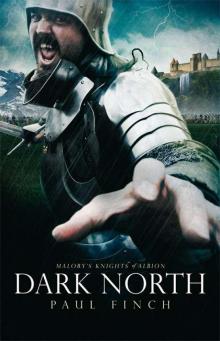 Dark North mkoa-3
Dark North mkoa-3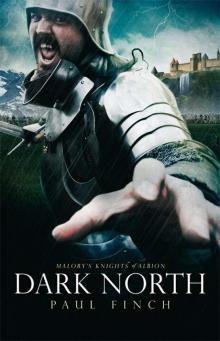 Dark North (Malory's Knights of Albion)
Dark North (Malory's Knights of Albion) a collection of horror short stories
a collection of horror short stories Sacrifice
Sacrifice Kiss of Death
Kiss of Death Medi-Evil 2
Medi-Evil 2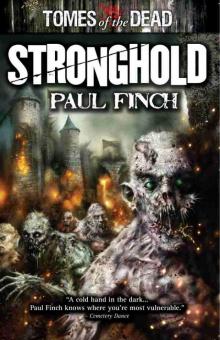 Stronghold
Stronghold Medi-Evil 3
Medi-Evil 3 Dead Man Walking
Dead Man Walking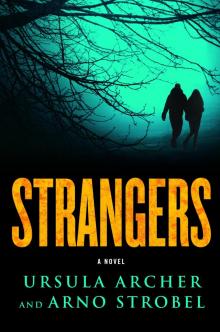 Strangers
Strangers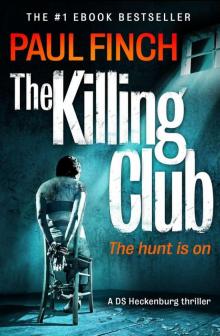 The Killing Club
The Killing Club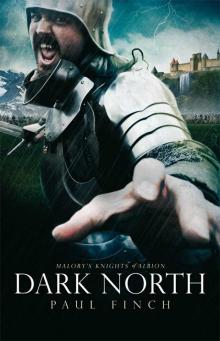 Dark North
Dark North A Wanted Man
A Wanted Man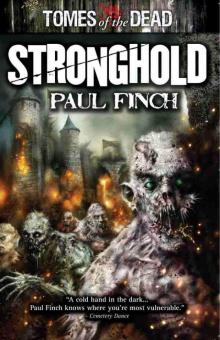 Stronghold (tomes of the dead)
Stronghold (tomes of the dead) Hunted
Hunted Cape Wrath
Cape Wrath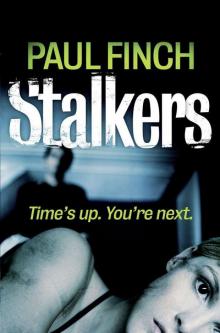 Stalkers
Stalkers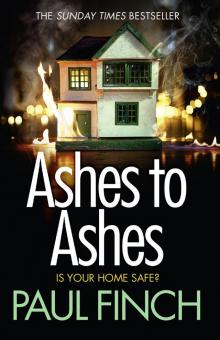 The Burning Man
The Burning Man Medi-Evil 1
Medi-Evil 1 Craddock
Craddock Hunted (Detective Mark Heckenburg Book 5)
Hunted (Detective Mark Heckenburg Book 5) 2nd Spectral Book of Horror Stories
2nd Spectral Book of Horror Stories The Chase
The Chase